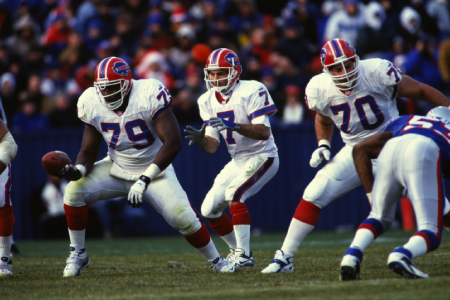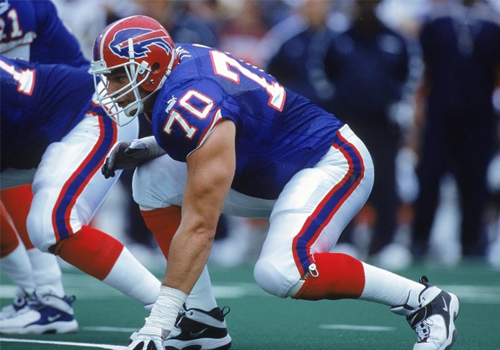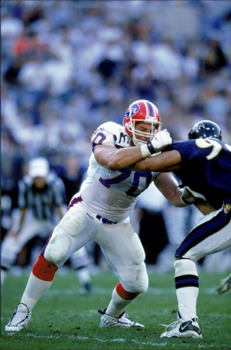When it comes to data security, a unified approach is crucial. Cybersecurity should be viewed as a team effort, with defense, offense, and kicking teams all executing the focused game plan.
In fact, many parallels can be drawn between cybersecurity and gridiron football.
Securing data with a strong offensive strategy is critical to winning the game. As an NFL player, my job as an offensive lineman, protecting the quarterback from threats coming from the opposition and looking out for the rest of the team on the front line. Skills such as peripheral vision, anticipation of movement, reading the opposition, and strength were all critical weapons in my arsenal, and I can now apply those same skills to cybersecurity.

Making split-second decisions
Peripheral vision is a crucial aspect for both athletes and cybersecurity experts. In football, players need to be aware of the entire field to anticipate opponents' movements and make split-second decisions. Similarly, in data security, having a broad perspective allows professionals to identify potential threats from various angles, helping to create robust defense strategies.
Anticipation of movement is another parallel. NFL players excel at predicting their opponents' actions, and data security experts can apply a similar mindset. By anticipating potential cyber threats and understanding attack patterns, they can stay one step ahead and proactively protect sensitive information.
Reading the opposition is another skill developed by football players and cybersecurity experts alike. In football, understanding the opposing team's strategies is crucial for success. In data security, understanding your adversaries and their tactics, techniques, and procedures (TTPs) is crucial for success. Analyzing past attacks and staying informed about emerging threats enables cybersecurity professionals to fortify defenses and mitigate risks effectively.

Mental resilience
In the world of offensive line, actions happen at a split-second pace, where, too often, the players don’t know where the threat comes from until it's upon them. This teaches them to evolve and pivot at speed.
Strength, both physical and mental, is another shared attribute. NFL players need physical strength to endure the demands of the game, and in the digital realm, cybersecurity professionals require mental resilience. Dealing with constant cyber threats and adapting to evolving technologies demands a strong and adaptable mindset to navigate the challenges effectively.
Cybersecurity isn't a solo mission. Teams need to work seamlessly to defend against sophisticated attacks, and adaptability helps professionals navigate diverse team dynamics and collaborate effectively with different skill sets.
Embracing change in a dynamic battleground
Another key attribute that both cybersecurity practitioners and NFL players have in common is adaptability to change.
During a recent webinar featuring NFL legend Emmitt Smith and myself, he also shared his views on how NFL players can offer valuable insights into data security through their unique skills on the field.
Smith said change is something that we all have experienced in our lives. Everyone tends to look at change as something frightening that will limit one's ability because they don't know what's on the other side of change.
He said one thing he has learned in life is that change is necessary. Change forces a person not to get stagnant and to evolve. The person who embraces change has an open mind and spirit and can see the opportunities that exist within change.
Although Smith’s initial dream was to be a quarterback, having a coach who saw something in him that he could not see in himself literally proved to be a game-changer. By making him a running back, the coach allowed Smith to see the field from a broader perspective and understand what was going on with the offensive line.
This gave him a holistic view of team defense and helped him become a more rounded individual, a better football player, and a better teammate.
The same can be said for the cybersecurity industry. The cyber landscape is a dynamic battleground. Being adaptable means players can swiftly adjust their strategies as new threats emerge, ensuring they are always a step ahead. And because cybersecurity is a game of constant problem-solving, having an adaptable mindset allows professionals to tackle novel challenges creatively and come up with innovative solutions on the fly.
Threat actors are a cunning bunch, always honing their craft, and cybersecurity professionals who can adapt to change can quickly adjust their defense mechanisms, making it harder for cybercriminals to find and exploit vulnerabilities.
Similarly, when a cyber-storm hits, an adaptable professional keeps a cool head. They can rapidly assess and respond to incidents, minimizing damage and orchestrating a swift recovery.
A strong backbone
The impact of modern threats is great, and much like the NFL, everyone has to do their part and become part of a unified team to ensure that the company is protected.

Offensive linemen live in the shadows of other positions of glory. There is little glory to be had in blocking for a touchdown. We are the foot soldiers, the bottom of the pyramid, and are only noticed when our job is done poorly. This is very similar to cybersecurity and the protection of data. Thales is not sexy - it sits in the background, but when the wheels are coming off, the backbone is strong, and the defense is in-depth.
Cybersecurity may lurk in the shadows, but a strong protection shines when the need comes. This is our job. This is Thales’ job. To protect you at all times.
Learn more about me in my podcast Off Tackle with John Fina.

 John Fina | Regional Sales Manager & Former NFL Player
John Fina | Regional Sales Manager & Former NFL Player